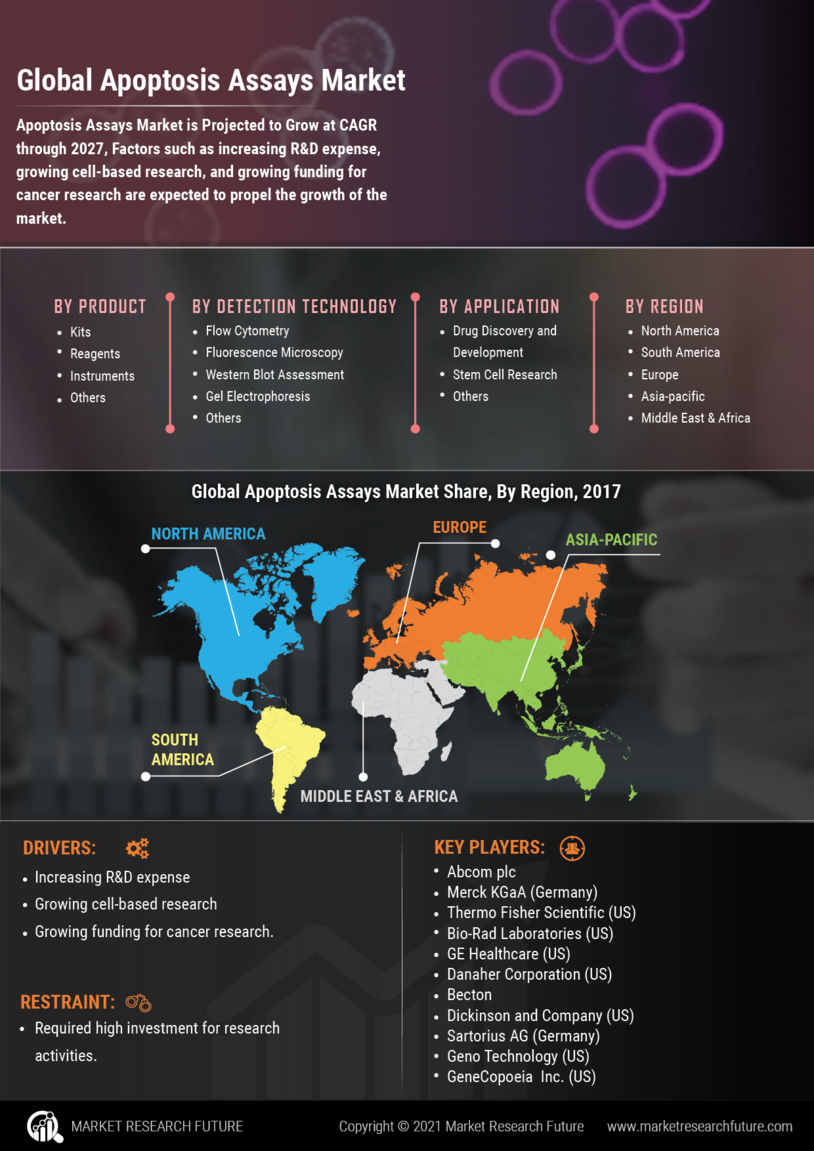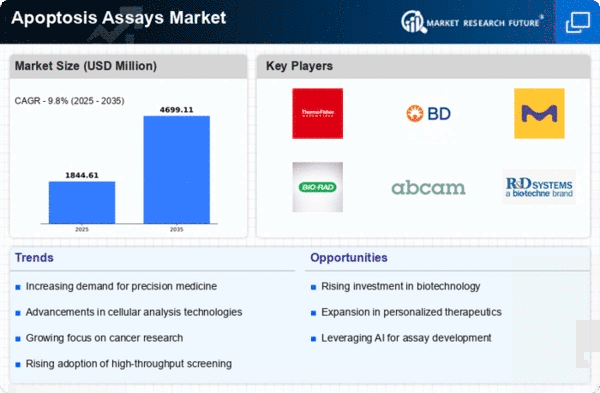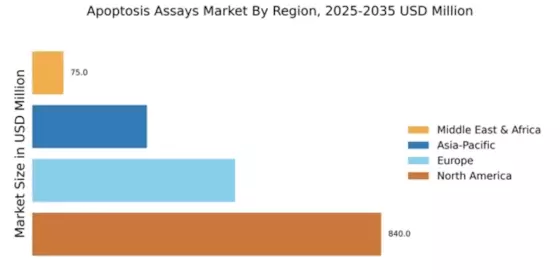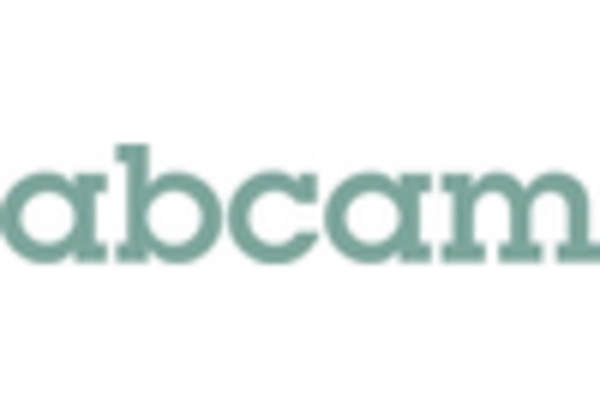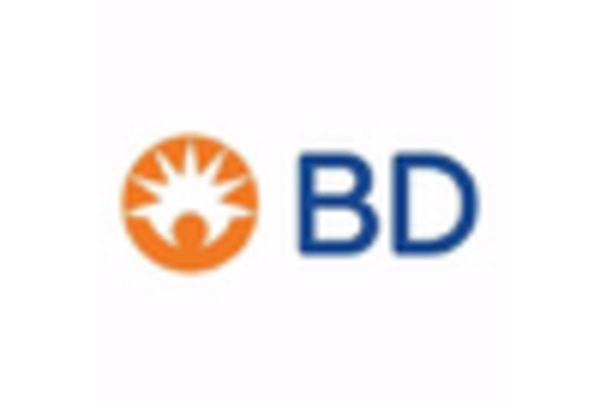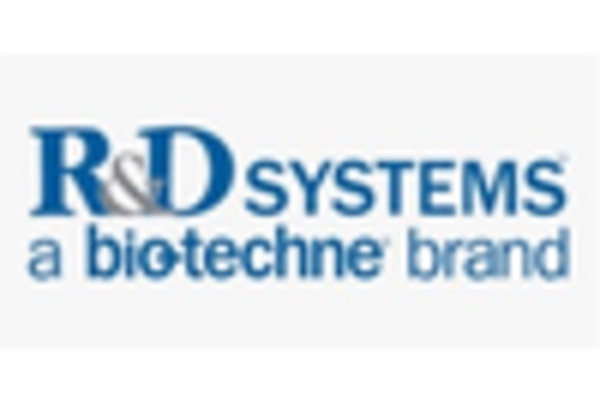Market Growth Projections
The Global Apoptosis Assays Market Industry is projected to experience substantial growth over the next decade. With a market valuation of 1.68 USD Billion in 2024, it is expected to reach 4.7 USD Billion by 2035. This growth trajectory suggests a compound annual growth rate (CAGR) of 9.8% from 2025 to 2035. Such projections indicate a robust demand for apoptosis assays, driven by various factors including technological advancements, increasing cancer prevalence, and the rising emphasis on personalized medicine. The market's expansion reflects the critical role of apoptosis assays in advancing biomedical research and therapeutic development.
Rising Incidence of Cancer
The increasing prevalence of cancer globally drives the demand for apoptosis assays. With cancer being one of the leading causes of death worldwide, the Global Apoptosis Assays Market Industry is witnessing heightened interest from researchers and healthcare professionals. For instance, the World Health Organization reports that cancer cases are expected to rise significantly, necessitating advanced diagnostic tools. Apoptosis assays play a crucial role in understanding cancer cell behavior and treatment responses. This growing focus on cancer research is projected to contribute to the market's growth, with a valuation of 1.68 USD Billion in 2024, indicating a robust demand for these assays.
Advancements in Research Technologies
Technological innovations in apoptosis assays are propelling the Global Apoptosis Assays Market Industry forward. The development of high-throughput screening methods and improved imaging techniques enhances the accuracy and efficiency of apoptosis detection. These advancements allow researchers to conduct more comprehensive studies, thereby facilitating drug discovery and development processes. For example, the integration of artificial intelligence in data analysis is streamlining the interpretation of assay results. As a result, the market is expected to grow at a CAGR of 9.8% from 2025 to 2035, reflecting the increasing reliance on sophisticated technologies in apoptosis research.
Regulatory Support for Drug Development
Regulatory bodies are increasingly recognizing the importance of apoptosis assays in drug development, which positively impacts the Global Apoptosis Assays Market Industry. Agencies such as the FDA emphasize the need for robust preclinical testing, including apoptosis evaluation, to ensure the safety and efficacy of new therapeutics. This regulatory support encourages pharmaceutical companies to adopt apoptosis assays in their research pipelines. As a result, the market is likely to experience sustained growth, driven by the necessity for compliance with regulatory standards in drug development processes.
Growing Demand for Personalized Medicine
The shift towards personalized medicine is influencing the Global Apoptosis Assays Market Industry significantly. As healthcare moves away from one-size-fits-all approaches, the need for assays that can tailor treatments to individual patient profiles becomes paramount. Apoptosis assays provide critical insights into how specific therapies affect cell death pathways, enabling clinicians to make informed decisions. This trend aligns with the broader movement towards precision oncology, where understanding apoptosis mechanisms can lead to more effective treatment strategies. Consequently, the market is projected to reach 4.7 USD Billion by 2035, underscoring the importance of these assays in personalized therapeutic approaches.
Increased Funding for Biomedical Research
The surge in funding for biomedical research is a key driver of the Global Apoptosis Assays Market Industry. Governments and private organizations are increasingly investing in research initiatives aimed at understanding cellular processes, including apoptosis. This financial support facilitates the development of innovative assays and enhances research capabilities. For instance, various national health institutes allocate substantial budgets for cancer research, which often includes apoptosis studies. The influx of funding not only accelerates research but also expands the market for apoptosis assays, as more laboratories seek to incorporate these tools into their studies.
